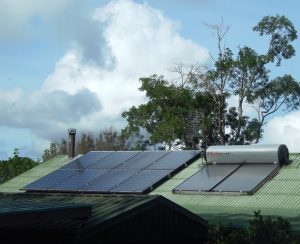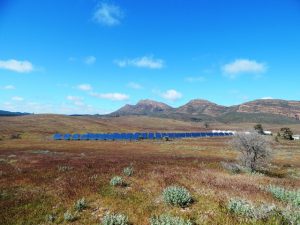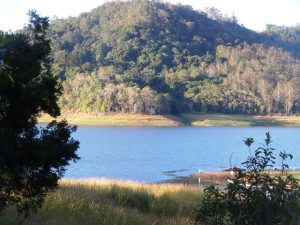
John Clarke has died of natural causes while bushwalking in Victoria’s Grampian Mountains. Clarke, best-known for the long-running ABC political skit Clarke & Dawe, was 68.
Sad way to start a week, hearing about the demise of Mr John Clarke, Dip Lid, PhD in Cattle (Oxen), advisor and comforter to various governments. Still, we like to think he is now having a celestial ale with the likes of Murray Ball, Bunny Walters and Phil Garland.
Clarke, the same age as your correspondent, initially found fame in his native New Zealand by creating the iconic gumboot-wearing, singlet-clad Kiwi farmer, Fred Dagg, father of seven boys, all named Trev.
John Clarke had a long and varied career in Australian film and television. He wrote film scripts, starred in films (he was the voice of Wal the dog in Footrot Flats), and was a regular on television in the 1980s and 1990s, including The Gilllies Report and a series he wrote and starred in, The Games.
He also wrote the original script for The Man Who Sued God, starring Billy Connolly. Don Watson wrote the final screenplay, but as movie reviewer David Stratton observed, Clarke’s ultra-dry approach to satire (exemplified in the Olympics spoof, “The Games”), can be detected at the heart of the film.
Clarke was best known for his ‘mockumentaries’ – satire in the form of the television interview. His long-running collaboration with Bryan Dawe first ran on the Nine Network in 1989 then was relaunched in 2000 on the ABC’s 7.30 Report.
For 27 years John Clarke and Bryan Dawe continued to broadcast a weekly satirical interview in which prominent figures spoke about matters of public importance. John pretended to be someone he wasn’t pretending to be and Bryan, the straight man, contained his frustration.
They outlived other ABC attempts at satire including The Roast, The Glass House and Good News Week, all axed or moved to short-lived stints on commercial TV.
Satire, rare as a hen’s pecker
Sharp, subtle satire is thin on the ground in Australia. Good written satire is rarer still. Toowoomba residents might remember Sir John Branscombe, a satirical writer of merit hiding behind a pseudonym and a pith helmet. Branscombe used clever anagrams to pillory 1980s-era politicians with his series of letters from the remote mountain village of Motowoboa, ruled by one King Elvic. It’s a shame no-one has revived this subtle style of satire, where you get away with a lot by inventing a Swiftian world that vaguely resembles the one you live in.
When Mad as Hell won a Logie in 2016, Anthony Morris (SBS) asked whether Australian satire was on its way back or too far gone to be saved. Morris took us back to 1966 when the Mavis Bramston Show won three Logies, arguably the last time we had good satire on Australian TV. Twenty years later came the Gillies Report (aided and abetted by John Clarke and Brian Dawe). The 1980s was a period when comedy spiced with satire prevailed – the Aunty Jack Show, the Norman Gunston Show, Rubbery Figures and Australia, You’re Standing In It.
“It’s easy to dismiss the Logies as a popularity contest,” writes Morris. “But comedy is meant to be popular – if nobody’s laughing, then it’s not working.”
“Put another way, Rove McManus has 16 Logies, including three Gold; The Chaser team has none.”
Last year, Mad as Hell and Gruen won Logies which sums up the state of satire in Australia, not counting in this context the Clarke & Dawe Thursday spot on the ABC.
When inducted into the Logies Hall of Fame in 2008, the then 60-year-old John Clarke typically quipped: “I’m inclined to regard this as a youth encouragement award. I’m deeply grateful and will do what I can.”
The final episode, maybe
Good evening Prime Minister and thank you for coming in at such short notice.
My pleasure, Bryan, or should I say my sadness for your loss.
Not just my loss Prime Minister, also John’s family and the people of Australia who admired his keen sense of political satire.
And his virile baldness, Bryan, although I never quite got his pretending to be me, or Tony, or Julia, or the little bloke from Queensland. He didn’t look like any of us or try to sound like us.
Yes but he got away with it through deadpan humour and taking on some of the traits of the person he was impersonating.
Quite, Bryan, but why am I really here?
We wanted to ask you about your trip to Papua New Guinea.
What trip to Papua New Guinea?
You know, across the waters from Cape York, where you keep asylum seekers locked away, out of sight and mind.
Oh that Papua New Guinea.
You’ve been accused of interfering in PNG’s sovereignty by visiting just a few days prior to a general election.
Well the ABC said that. I never said that.
They also said you were ‘tight-lipped’ over the fate of refugees held on Manus Island, even when a PNG court has ruled that their detention on Manus is illegal.
I don’t know about tight-lipped. It’s just the way God made my face.
You congratulated Papua New Guinea for making “significant progress” in resettling 1,000 asylum seekers who are in their fourth year in PNG. We’re hearing that fewer than 20 have been resettled, is that right?
Well I’m not there now, Bryan. It’s very hard to know what’s going on when you’re not actually boots on the ground in PNG. As they say in the Highlands, Mi no save nating long dispela samting! Nice touch providing Niugini Gold in the green room, by the way.
And then you went on to India for what were said to be business meetings. Was one of those meetings with executives from Adani?
Oh good try, Bryan. No, we try very hard to stay out of State government affairs and if Queensland wants Adani to build an export coal mine in their State, good luck to them I say.
So you did meet with Adani?
Don’t put words in my mouth Bryan. As I said, it is State government business, even though the Federal Environment minister has the last word on approvals.
So is he going to approve it?
Early days, Bryan. Early days. But now let me ask you a question.
Oh, well, why not?
Many of my colleagues have been fans of Clarke & Dawe, for years, Bryan, years. They have all the boxed sets from the ABC or their own private copies. Sometimes we watch replays before cabinet meetings. You’ve become famous, but now you’re a man down. What are you going to do about that?
Someone will step up, Prime Minister.
(Waggles eyebrows and makes like Groucho Marx). I like to follow the horses, Bryan. But the horses I like to follow also like to follow the horses.
Don’t give up your day job, Prime Minister. Thanks for coming in.
The pleasure and the sadness was all mine.


 Our next Maleny house concert on April 23 features two talented alt-country songwriters, Kelly Cork and Brad Butcher. They’ll be performing in a songwriters-in-the-round format.
Our next Maleny house concert on April 23 features two talented alt-country songwriters, Kelly Cork and Brad Butcher. They’ll be performing in a songwriters-in-the-round format. Brad Butcher is also heading to the studio this month to put the polish on songs developed on a recent trip to the US. His new album out later this year will follow the acclaimed Jameston. He and Kelly last performed on the same stage in Tamworth but also at last year’s Maleny Music Festival. The concert on Sunday April 23 starts at 2pm. Tickets are $15/$12 and if you want to book (recommended), send Laurel(goodwills@ozemail.com.au) an email or use the contact form on our website.
Brad Butcher is also heading to the studio this month to put the polish on songs developed on a recent trip to the US. His new album out later this year will follow the acclaimed Jameston. He and Kelly last performed on the same stage in Tamworth but also at last year’s Maleny Music Festival. The concert on Sunday April 23 starts at 2pm. Tickets are $15/$12 and if you want to book (recommended), send Laurel(goodwills@ozemail.com.au) an email or use the contact form on our website.



 Sunday August 6 2pm: Irish songwriter Kieran Halpin (All the Answers, Angel of Paradise, Mirror Town), makes a welcome return to Maleny. He is visiting from Germany and on a tour of Australia. If you are not familiar with his work, go to his
Sunday August 6 2pm: Irish songwriter Kieran Halpin (All the Answers, Angel of Paradise, Mirror Town), makes a welcome return to Maleny. He is visiting from Germany and on a tour of Australia. If you are not familiar with his work, go to his 

